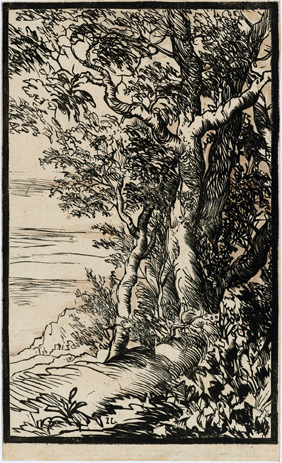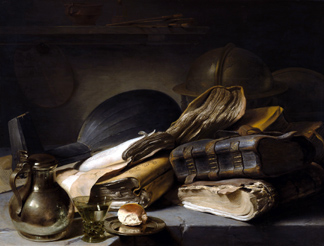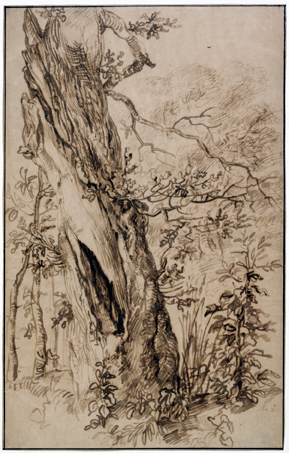
(845) 246-6944 ·
info@ArtTimesJournal.com
 Saint Paul, c. 1624-1625 oil on panel 94 x 78.7 cm (37 x 31 in.) Agnes Etherington Art Centre, Kingston, Gift of Alfred and Isabel Bader, 2006 |
at the National Gallery of Art
all
Photos courtesy of The National Gallery of Art
By RAYMOND J. STEINER
ART TIMES December 2008
Although it is true that some fine artists have been purposely ignored
or under-rated — most women artists in general immediately come
to mind, but it was particularly true of female botanical artists in the
past whose work was often not even signed (see, for example, our review
‘Drawn and Colored by a Lady’ at Arader Galleries in our March 2007 Issue)
— there are examples, like this one, where the artist just simply
had ill luck.
 Landscape with a Group of Trees, c. 1640 woodcut 24 x 15 cm (9 1/2 x 5 7/8 in.) Rijksmuseum, Amsterdam |
Jan
Lievens had the misfortune of being born in the same town as and only
one year apart from Rembrandt van Rijn who, as everyone knows, handily
“took the field” in art historical terms and in no uncertain manner. Though
a fellow-student in Pieter Lastman’s atelier — and, to some, equally
if not more promising as a painter than Rembrandt — Lievens’s
reputation and career not only hardly got off the ground, but seemed to
simply become overshadowed as Rembrandt dominated the art world —
back then, even as he does now.
Wheelock
judiciously explores the “whys” of Lievens’s apparent bad luck, citing
the painter’s moving about (to England and other Netherlandish towns and
cities) along with his propensity to change “directions” in his focus
and work, among the most probable causes of his falling below the art/historical/critical
radar. In all probability, Wheelock is spot on, since — in spite
of his apparent inability to settle on a ‘signature’ style — even
a cursory glance at Lievens’s work will reveal a master painter…so good,
in fact, that some of his work had even been attributed to Rembrandt
over the years. Justly, then, Wheelock uses the word “rediscovered”
(rather than, ‘reconsidered’, say) in the title of his essay, for this
is surely a case where a major talent has been carelessly pushed into
the background.
 Still Life with Books, c. 1627-1628 oil on panel 90.3 x 119.3 cm (35 9/16 x 46 15/16 in.) Rijksmuseum, Amsterdam |
Arranged
chronologically, 139 paintings, etchings, woodcuts, and drawings (in pen
and chalk) make up the show, more than enough to establish Lievens’s reputation
as a master in his own right. Whether in portraiture (cf. “Old Woman Reading”,
Cat. No. 1), landscape (cf. “Dune Landscape with Trees”, Cat. No. 43),
still life (cf. “Still Life with Books”, Cat. No. 11); religious themes
(cf. “Saint Paul”, Cat. No. 4 or “Christ on the Cross”, Cat. No. 32),
or mythological (cf. “Mars and Venus”, Cat. No. 50), Jan Lievens certainly
proved his prowess in oil painting. For those interested in his draftsmanship,
I especially draw attention to his “Landscape with a Group of Trees” (Woodcut,
Cat. No. 80) and “Old Tree Trunk in Front of a Forest” (Brown Ink on Oriental
Paper, Cat. No. 135).
If
Dutch realism is among one of your particular passions, you won’t want
to miss this show.
 Old Tree Trunk in Front of a Forest, c. 1655-1665 pen and brown ink on oriental paper, the outlines partially indented 35 x 22.2 cm (13 3/4 x 8 3/4 in.) The British Museum, London |
*“Jan
Lievens: A Dutch Master Rediscovered” (thru Jan 11, ’09): National Gallery
of Art, National Mall, between 3rd and 9th Streets
at Constitution Ave., NW, Washington DC. The exhibition will then travel
to the Milwaukee Art Museum (Feb 7 — Apr 26. ’09) and close at the
Rembrandthuis, Amsterdam (May 17 — Aug 9, ’09). A fully-illustrated
catalogue by Arthur K. Wheelock, Jr. accompanies the exhibition (reviewed
ART TIMES November 2008 Issue): 320 pp.; 9 ¾ x 11 ¾;
295 Illus., 250 in Color; Notes; Select Bibliography; Index. $65.00 Hardcover.
A related exhibit, “Dutch Cityscapes”, is scheduled to run from Feb
1 — May 3, ‘09)